
Co-Design Process | TFWS Regional Process | Global Conference | UN 2023 Water Conference
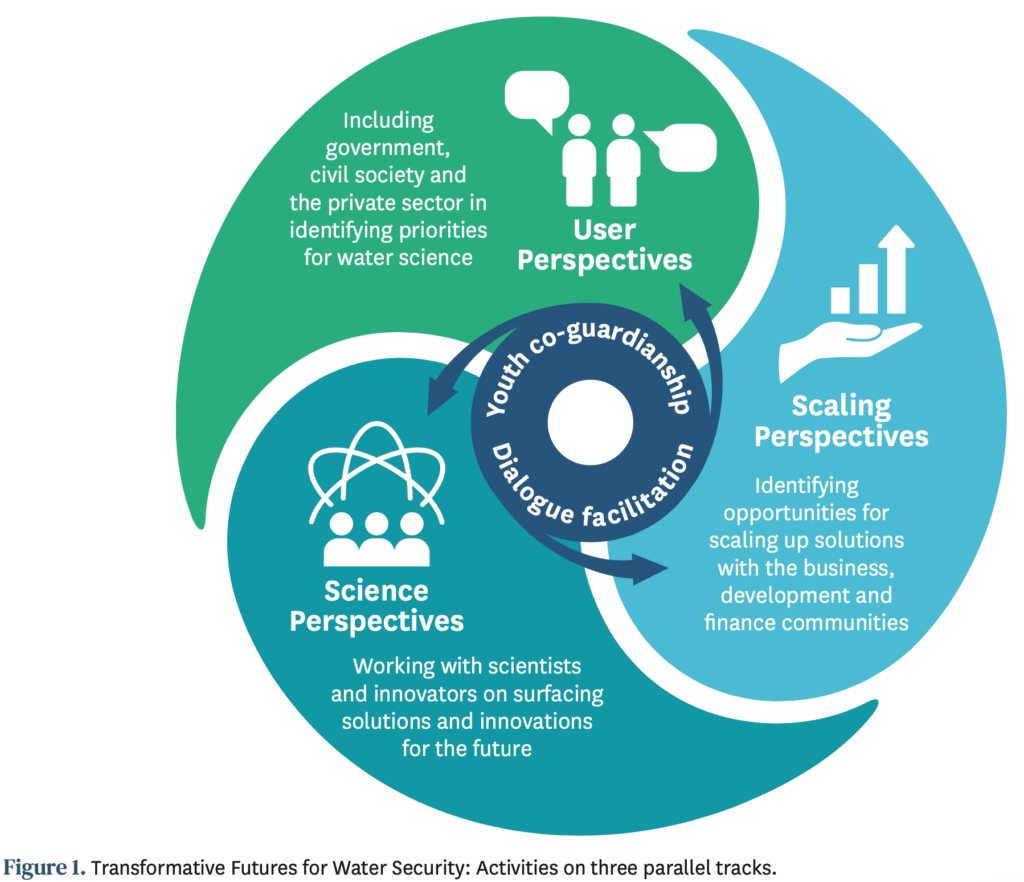
The TFWS initiative builds partnerships and coalitions among the policy, business, development, practitioner, and science communities, balancing voices from the Global South and Global North in order to focus and strengthen the science base for action on water security.
Powered by mission-driven alliances, the initiative aims to ensure that political progress towards a more urgent and coherent agenda for water policies, investments, strategies, and accelerated action is better supported by scientific progress. Doing so will enhance our collective ability to deliver and catalyze high-ambition, future-ready innovation and inclusive, science-based solutions for water security.
The TFWS initiative is backed by stakeholder engagements and consultations, targeted surveys that gauge where the science-action and science-policy gaps are most acute, and multi-partner policy-oriented publications.
Youth networks for water and science are “co-guardians” of the TFWS process to ensure that those who have the greatest stake in future water security, and the water science needed to support it, are at the forefront (Figure 1).
Co-Design Process
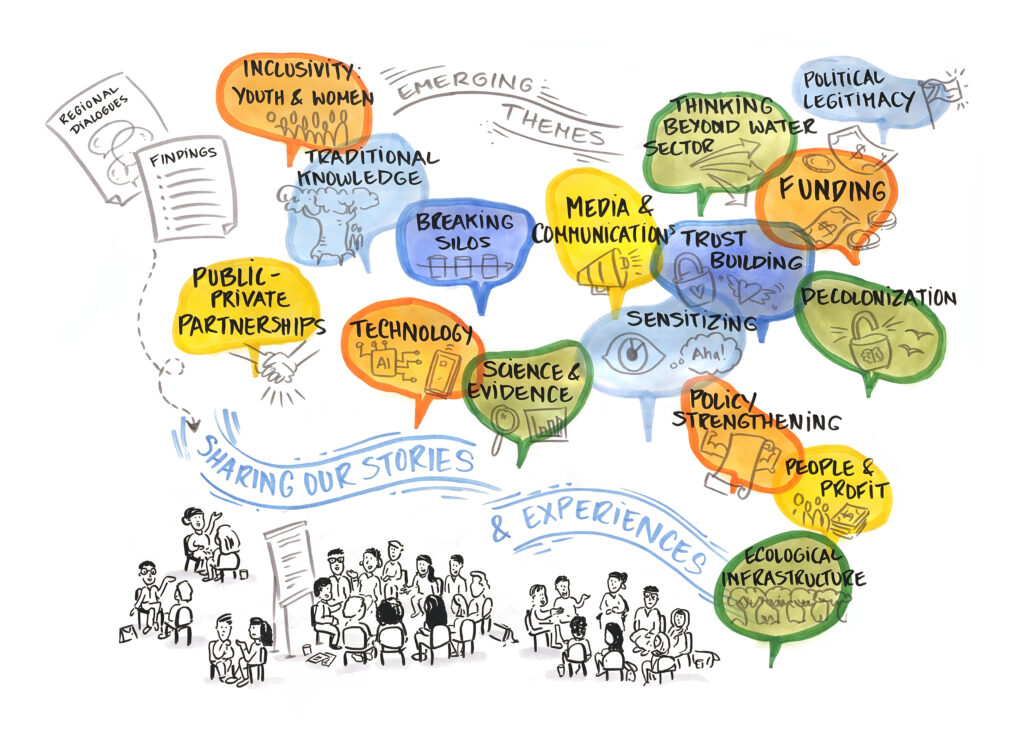
The TFWS initiative emerged as a way to identify high-ambition, collective actions that would create strong alignment and convergence of knowledge and research, policy, business and on-the-ground implementation to deliver future water security.
During the co-design process, we engaged in various sessions at international events such as the Global Change Conference in South Africa, the World Water Forum in Dakar, World Water Week in Stockholm, and Cairo Water Week.
The TFWS team also led three impactful co-design workshops, alongside a series of feeder events in India, Sri Lanka, Nepal, and Pakistan. These efforts were aimed at fostering collaboration with local and regional partners to identify and prioritize key headline messages to be carried forward to the Regional Dialogues.
Young water professionals played a crucial role throughout the co-design process, actively participating as facilitators and rapporteurs. Their active involvement brought fresh perspectives and energy to the discussions, enriching the outcomes and ensuring a holistic approach to the development of our initiatives.
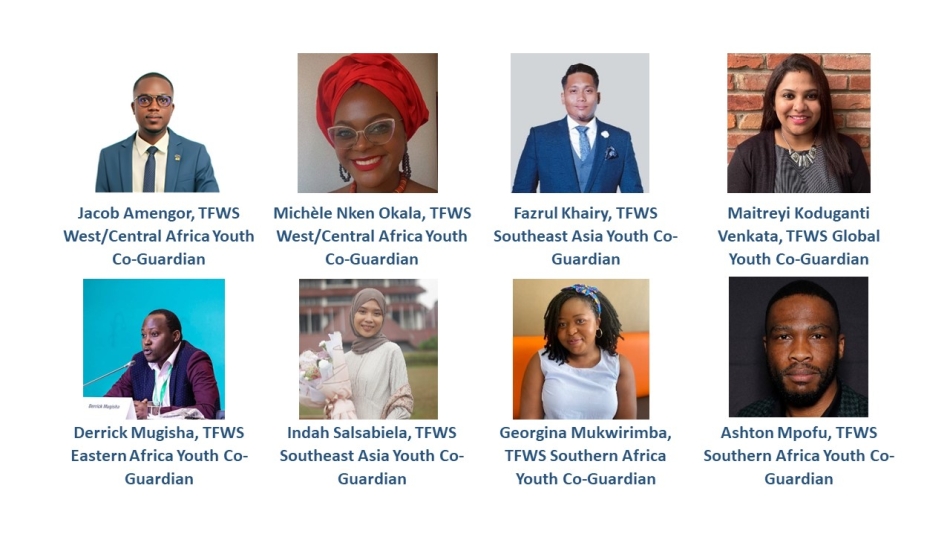
Youth are at the center of transforming the future of water – hear what they have to say
It is essential that young people working in water and science are ‘co-guardians’ of the Transformative Futures for Water Security initiative. Read more…
2023
- 15th to 17th – Global Conference in Cape Town
- 3rd – Pakistan feeder event
- 4th – 13:00-17:30 CET – MENA Regional Dialogue
- 5th – 8:00-12:30 CET – MENA Regional Dialogue
- 9th to 10th – 9:00-13:30 CET – South Asia Regional Dialogue
- 11th – 14:30-19:00 CET – West/Central Africa Dialogue
- 12th – 9:30-14:00 CET – West/Central Africa Dialogue
- 12th – 11:30 – 16:00 CET – Eastern Africa Regional Dialogue
- 13th – 7:00-11:30 CET – Eastern Africa Regional Dialogue
- 17th to 18th – 7:00-11:30 CET – SE Asia Regional Dialogue
- 19th 20th – 15.00-19.30 CET – Latin American Regional Dialogue
- 26th – 12:00-16:30 CET – Southern Africa Regional Dialogue
- 27th – 11:30-16:00 CET – Southern Africa Regional Dialogue
2022
- 21st to 22nd – 9:30-14:00 CET – Central Asian Regional Dialogue (in local language)
- 3rd – Nepal Feeder Event
- 24th – Pakistan Level Feeder Event
- 11th – First Co-design workshop
- 12th – Second Co-design workshop
- 17th – Third Co-design workshop
TFWS Regional Dialogues
At the end of 2022 and the beginning of 2023, the centerpiece of the TFWS initiative was a series of regional multi-stakeholder dialogues that culminated in a final conference held in Cape Town, South Africa in February 2023.
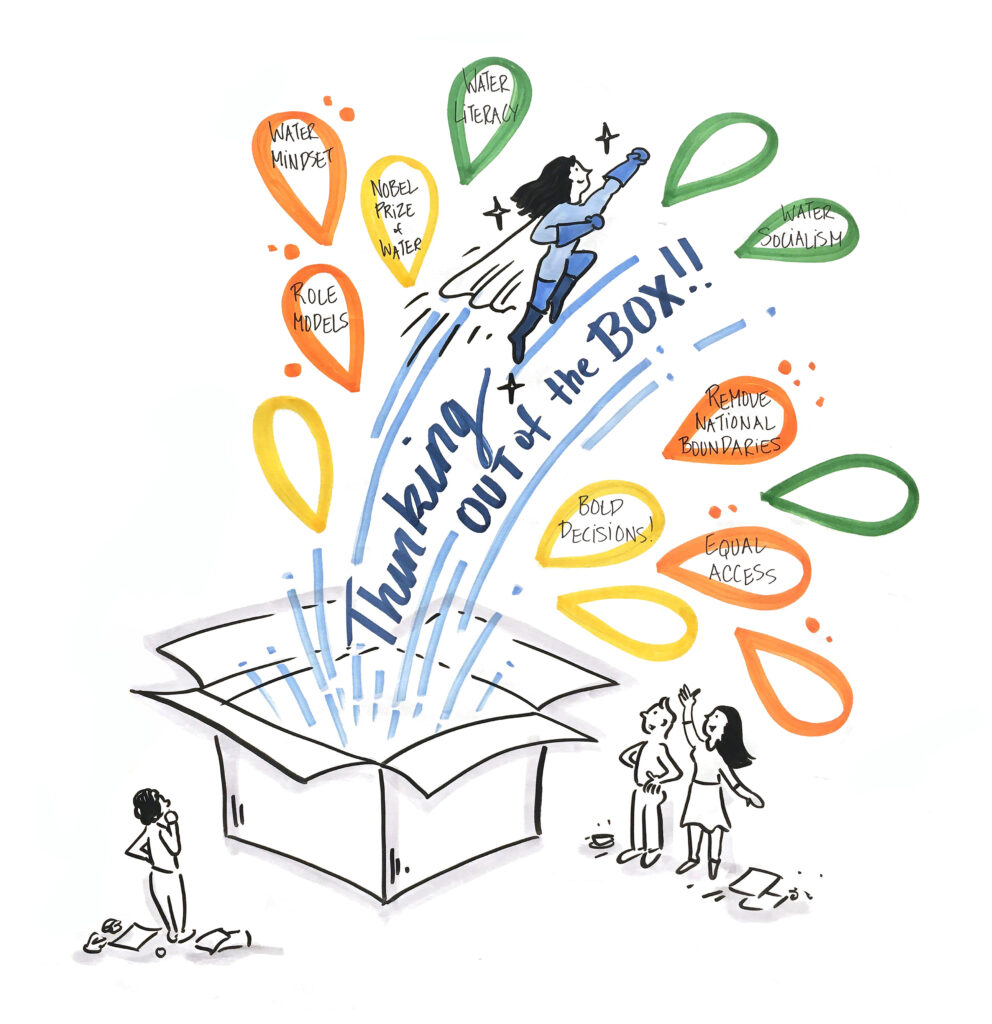
The regional dialogues were interactive and collaborative workshops where participants shared their personal experiences, perspectives, and ideas regarding water security. These dialogues aimed to enhance the role of water science in advancing the global efforts to achieve Sustainable Development Goal 6 (SDG 6) and establish resilient water security in the face of increasing water-related challenges in this century.
The insights gathered from the regional dialogues played a vital role in shaping the water security action plan developed during the TFWS Global Conference in South Africa. Additionally, these dialogues made a valuable contribution to the activities of the TFWS team during the United Nations (UN) 2023 Water Conference, which took place from March 22 to 24, 2023, in New York, USA.
The TFWS initiative had sixteen representatives from Global South youth networks for water and science as co-guardians. They played a crucial role in shaping the initiative by actively participating in various aspects of its development. As co-guardians, they were instrumental in the co-designing of the regional dialogues, and took charge of collecting valuable information during the dialogues, capturing the diverse experiences and insights shared by the attendees.
South-South dialogues
Communities that are least responsible for the climate and water crises are often the most vulnerable to their impacts. Therefore, the TFWS initiative convened virtual regional dialogues in Central Asia, South Asia, Southeast Asia, Central and West Africa, East Africa, Southern Africa, Latin America, and the Middle East and North Africa, which were grounded in inclusive partnerships, including among organizations in the Global South and Global North.
Each Regional Dialogue was organized in collaboration with Regional Steering Committee partners, who played a crucial role in shaping the discussions. These esteemed partners not only provided invaluable insights into local contexts but also represented diverse perspectives, enriching the overall conversation. Their active involvement ensured that the Regional Dialogues were comprehensive and inclusive, incorporating a wide range of viewpoints.
The dialogues were conducted in English, with translations available in Russian for the Central Asia dialogue, Arabic for the Middle East and Northern Africa dialogue, French for the West and Central Africa dialogue, and Spanish for the Latin America dialogue.
An unconventional approach
Each regional dialogue gathered policymakers, user groups, funders and donors, knowledge generators, local governments, youth and participants from the public and private sectors to ensure equal representation across all stakeholder groups of the water community, and amplify the voices of the most marginalized.
The dialogues were co-convened by IWMI and Regional Steering Committee members. Each dialogue was co-designed and facilitated virtually by Perspectivity, a community of professional facilitators of social change in complex systems.
Input and feedback from participants, along with content and materials pertaining to the regional dialogues, were gathered and organized on Padlet—an online notice board. Visit each board by clicking the links below:

- Central Asia Dialogue Padlet.
- MENA Dialogue Padlet.
- South Asia Dialogue Padlet.
- West and Central Africa Dialogue Padlet.
- East Africa Dialogue Padlet.
- Southeast Asia Dialogue Padlet.
- Latin America Dialogue Padlet.
- Southern Africa Dialogue Padlet.
Read the Regional Dialogue Reports to learn more
Global Conference in Cape Town, South Africa
The Global Conference convened 120 water and non-water representatives from local state agencies, the public sector, civil society, academia, youth, and the commercial sector.

Over a period of three days, participants from 44 different organizations and 55 countries actively engaged in a participatory and dynamic process inspired by the Future Search conference methodology, a unique task-focused planning method that helps people transform their capability for action and enables large, diverse groups to collaborate on projects. Participants from the Southeast Asia region gathered in Vientiane, Laos for a satellite event that followed the same agenda. Their findings contributed to the final outcomes of the Global Conference in Cape Town.
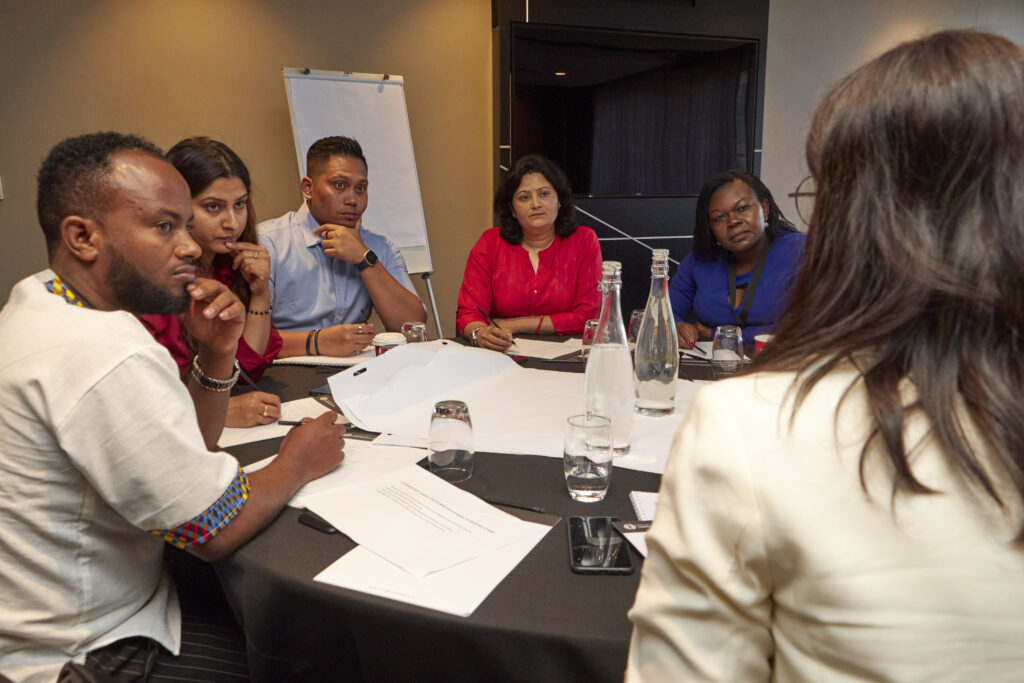
Participants all focused on addressing one central question: “What are high-ambition, collective actions that will create a strong alignment of knowledge and research, policy, business, and on-the-ground implementation to deliver future water security?”
The Global Conference built on the outcomes of the Regional Dialogues and feeder events that were held in the Middle-East and North Africa, Central Asia, Southeast Asia, South Asia, Central and West Africa, East Africa, Southern Africa and Latin America in 2022 and early 2023. From those dialogues emerged 10 water themes and 13 drivers for transformative change, which were used to answer the central question and formulate the TFWS missions.
The process was led by:
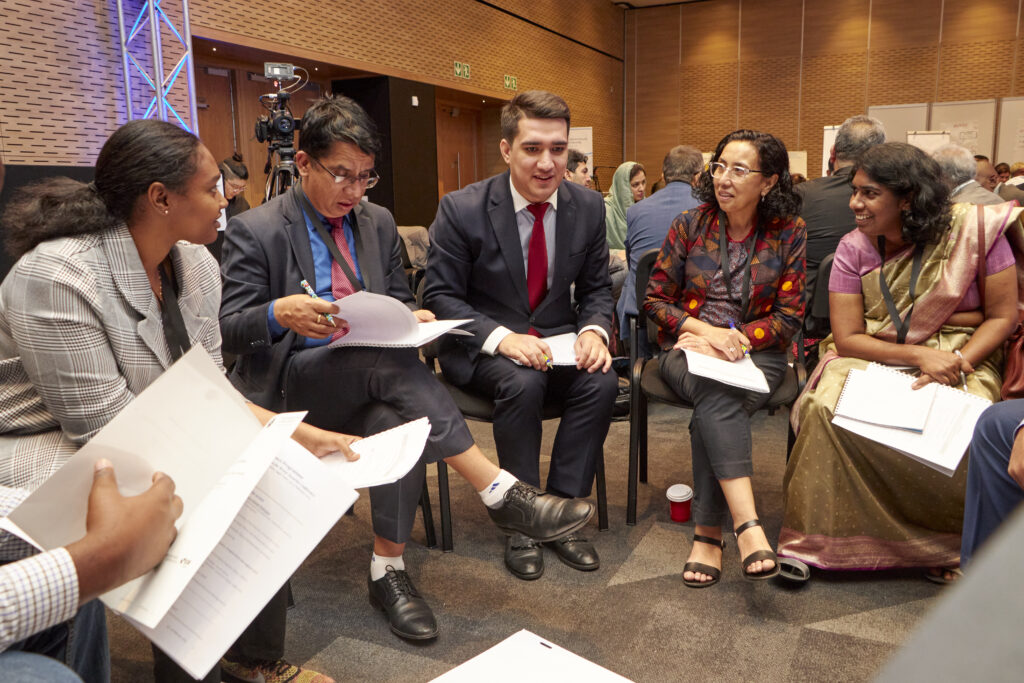
- Two lead facilitators from Perspectivity who oversaw, facilitated and guided the process.
- Two co-facilitators from Perspectivity who ensured the smooth execution of activities, answered questions from participants and liaised with the Southeast Asia satellite event.
- Sixteen youth co-hosts who supported the lead facilitators. Each youth-co-host having attended at least two regional dialogue, the group actively contributed to discussions and encouraged participants to take on new roles within the Global Conference process.
- A delegation of representatives from the International Water Management Institute, whose role was to listen and guide conversations.
The Global Conference included facilitation exercises focused on scenario exploration to integrate user, science and scaling perspectives. The dialogues were also based on a multi-stakeholder approach to help bridge the science-policy-action gap, break down silos to reduce fragmentation and catalyze more inclusive dialogue across the biophysical, social science, and public health domains.
Invitees were selected for their stake in the outcomes of the dialogue, their knowledge on the topics discussed, their willingness to make commitments, and their capacity for high-ambition action.
Input and feedback from participants, along with content and materials pertaining to the Global Conference, were gathered and organized on Padlet—an online notice board.
We are grateful for the support of our sponsoring partners:

UN 2023 Water Conference

The United Nations (UN) 2023 Water Conference, a landmark event as the first UN conference on water since 1977, took place in New York City from March 22nd to 24th. This significant conference was jointly hosted by the Governments of Tajikistan and the Kingdom of the Netherlands. With an attendance of over 7,000 participants from across the globe, the conference aimed to assess the progress achieved during the Water Action Decade and garner commitments to drive a bold Water Action Agenda.
During the conference in New York, the TFWS team actively engaged in various activities. We co-hosted a compelling event within the UN building in collaboration with the Government of Pakistan, organized a side event at the Nature Hub and participated in numerous official and side sessions.
To access recorded content from these events, please click the links provided below.
- Mission critical: Transforming Future Water Security, held at the Nature Hub
- TFWS: Moving from words to action (co-convened with the Government of Pakistan)
- Secure water allocation for sustainable food production and the environment
- AWS event: Common good outcomes through water stewardship: the power of a multi-stakeholder standard to drive effective, verifiable collaboration between business, civil society, and government
- National Water Roadmaps toward the 2030 Agenda
- Pathway Forward: Water-resilient, Sustainable, and Inclusive in Asia and the Pacific
Since the UN Water Conference
Since the UN Water Conference, the TFWS team engaged with local and regional stakeholders to present the Missions and carry them forward:
- The IWMI-Southeast Asia office signed a letter of Agreement with ACIAR on a TFWS Roadmap in Southeast Asia
- The IWMI-MENA office launched a webinar series based on the outcomes of the Regional Dialogue to push the reflection further about actions areas
- In Southern Africa, TFWS led a webinar titled ‘Water Security in Southern Africa: A Mission Possible’
- In Central and West Africa, the TFWS team mobilized country champions in Ghana, Nigeria, Senegal and Rwanda to advocate for the inclusion of the TFWS missions in their country strategies
- In Pakistan, the TFWS team presented the Missions to several Ministry representatives
- Roundtable discussions in Nepal: Operationalizing the TFWS Missions: Future Priorities for Research, policy, and Practice for Development
- The TFWS process and Missions were presented at the Water for Food conference in Nebraska
- We presented the Missions at the Eighth Annual Alliance for Water Stewardship Global Forum
